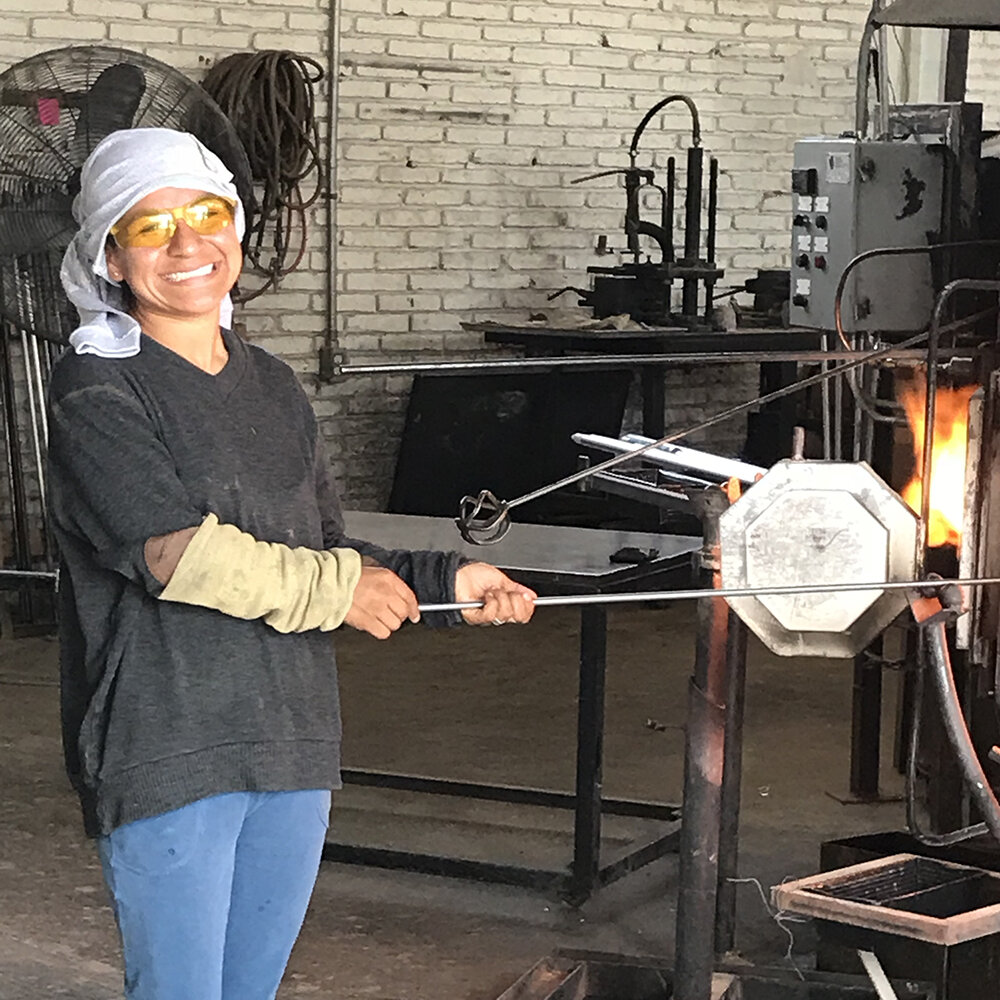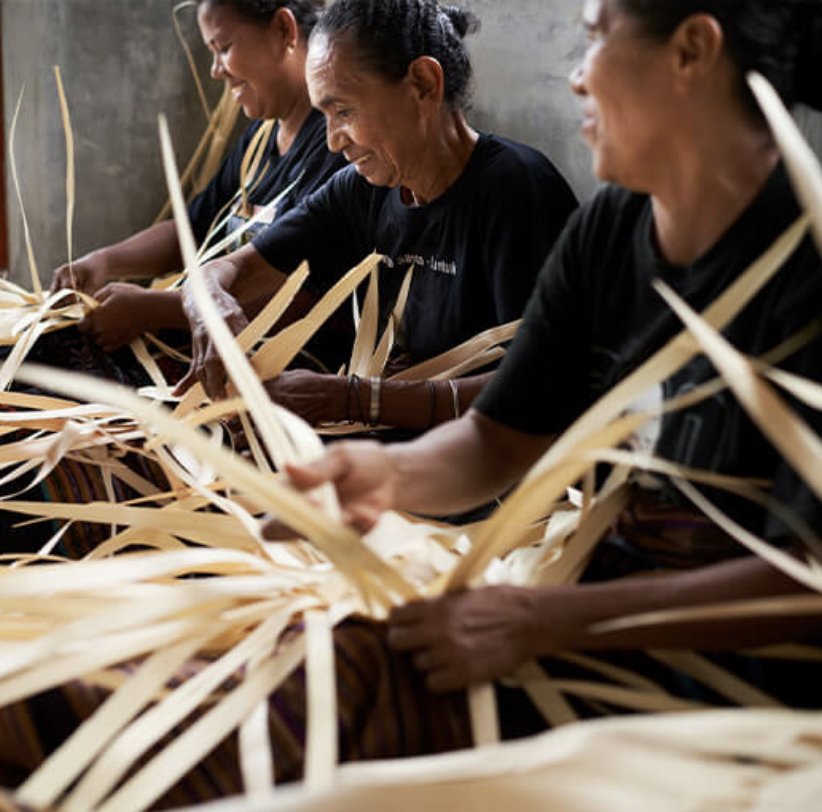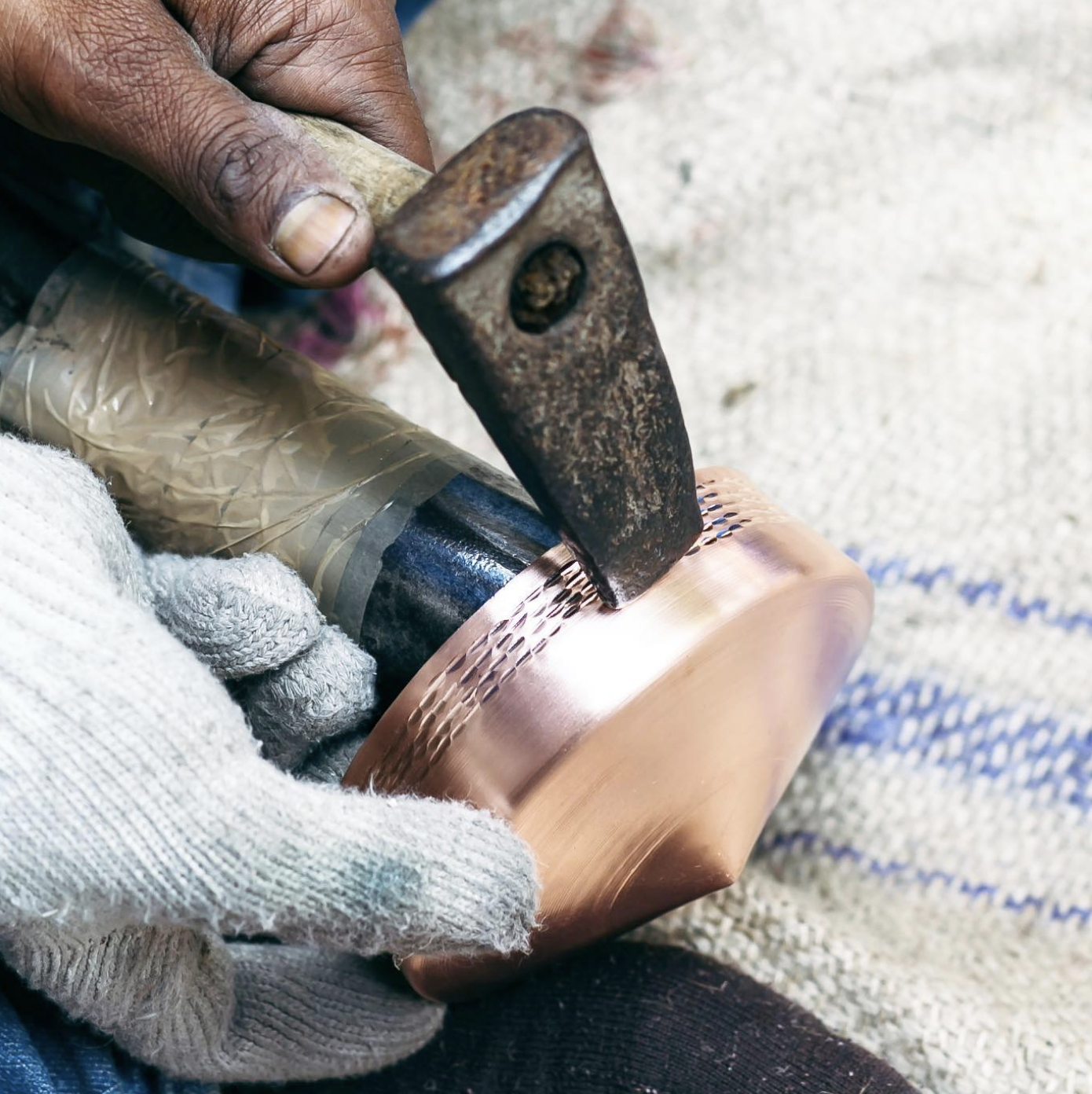Creating Sustainable Livelihoods.
The R.I.S.E Artisan Fund deploys capital using a range of investment vehicles from grants to revenue-based equity investments while seeking a return of capital for further investment, creating a reinvestment cycle that multiplies the catalytic impact of philanthropic capital.
R.I.S.E Artisan Fund invests in artisan enterprises who are redesigning business models based on:
Sustainable and ethical business practices
Skills development and training to increase sales and profitability for producers
Revenue or profit sharing with producers
Revitalization, revaluation and representation of traditional crafts and cultural heritage
Shared ownership structures around brand, design and stories
Our Impact Investment Portfolio
Advocacy
200 Million Artisans
200 Million Artisans catalyzes self-reliance and responsible innovation within India’s artisan economy by providing access to knowledge, resources, and networks that empower artisan-producers and first-time entrepreneurs focused on sustainable production and consumption.
Crossing the Digital Divide: Opportunities to Scale Impact in the Artisan Sector
Slow fashion
Avani
Nestled in the Kumaon region of the Indian Himalayan state of Uttarakhand, Avani is a community built on the principles of sustainability and local empowerment. The name “Avani” comes from the Hindi word for Earth. Avani creates opportunities for rural women and men to find viable employment through a self-sufficient and environmentally sustainable supply chain.
Trusting the Power of Community
Informal settlements
Bawa Hope
Bawa Hope is an ethical fashion company working with 140 artisans in the informal settlements in Kenya to create and develop contemporary, ethnic jewelry which satisfies the conscious consumer’s desire for value, quality and fashion while creating sustainable opportunities for artisan communities.
Bawa Hope collaborates with refugee artisans to produce a line for MADE51.
Fair trade
Bethlehem Fair Trade Artisans
Bethlehem Fair Trade Artisans is a Fair Trade organization supporting Palestinian artisans creating home décor, kitchenware and accessories with traditional Palestinian materials and craft techniques. Each piece is handcrafted with care, using hand carving and hand molding techniques passed down through generations. By marketing these products worldwide, Bethlehem Fair Trade Artisans shares the heritage and craftsmanship of Palestine with the world.
Textile traditions
Bibi Hanum
Bibi Hanum is a fashion and textile design studio based in Uzbekistan creating its own, handwoven, tie-dyed silk and velvet ikat fabrics to make its apparel and accessories collections.
Patagonian woolens
Chilote Shoes
Chilote Shoes creates livelihoods for more than 50 rural women in Patagonia in southern Chile, who craft wool slippers with locally sourced, natural fibers.
Turning mud into beauty
Colectivo 1050º
Colectivo 1050º is cooperative formed by 17 members, who represent more than 50 potters from seven different communities in Oaxaca, Puebla and Chiapas in southern Mexico, each with its own unique techniques, language and territory.
Through the cooperative, the commercial branch of Innovando la Tradición, families have become financially stable, are being recognized by their communities, and have developed renewed hope in fighting for their trade.
Sustainable crafts
Collaborative Craft Projects
Collaborative Craft Projects works closely with more than 25 artisan communities throughout Zimbabwe and Southern Africa to design, develop and make handcrafted homeware and furniture that is beautiful and functional. Their products showcase traditional skills and craftsmanship, bringing them to both local and global markets.
www.collaborativecraftprojects.com
A tapestry of wisdom\
Delzur
Delzur collaborates with 220 artisans in 12 indigenous communities in seven regions in Columbia to weave a tapestry of cultural reverence and ecological harmony in its handcrafted collections. Indigenous stewardship has proven to be one of the most effective methods for protecting biodiversity and mitigating climate change. In Colombia, 35% of national territory is titled to and governed by indigenous and Afro-Colombian communities, including 50% of Colombia’s remaining forests.
Delzur: Weaving a Tapestry of Cultural Reverence and Ecological Harmony
Natural materials
DuAnyam
Du Anyam promotes and preserves traditional wicker craft, while improving the livelihoods and maternal health of 400 women artisans in rural Indonesia.
Backstrap loooms
Du Xhil
Social designers Maddalena Forcella and Ana Paula Fuentes collaborated with 24 weavers in the Zapotec community of San Bartolo Yautepec, in the Sierra Sur region in southern Mexico to develop an elevated, handwoven textile collection. Using back-strap looms that predate the arrival of Spanish colonialists, the Zapotec weavers produce fabric with intricate brocade motifs. The fabric is then used to create huipiles, traditional Mexican garments, now marketed under the brand Du Xhil - San Bartolo Yautepec
Community built housing
Echalé
Échale boosts sustainable community development through social inclusion in the planning and self-construction of housing and community infrastructure in rural México for marginalized, or disadvantaged communities. Through use of appropriate technology, access to financing and participatory processes, Échale has delivered more than 250,000 housing solutions in 28 states in México, benefiting more than one million people.
Handwoven textiles
Fair Weave
Fair Weave is a social enterprise working with 120 women weavers based in the Phnom Srok district in northwestern Cambodia to offer ethically made, handwoven textiles made with natural fibers and dyes for home furnishings and apparel. In this region of Cambodia, Khmer women have been weaving since the 13th century. Textiles are handwoven on traditional looms with skills handed down from mother to daughter for generations.
Production advances
FECCEG
FECCEG is a federation of 17 associations and cooperatives of farmers established to help small coffee producers in Guatemala to overcome price fluctuations and risks of the international coffee market. The federation works with 1,550 member farmers in nine departments of Guatemala. More than 30% of the member farmers are women.
Art on your feet
Fuchsia Shoes
A direct-to-consumer brand, Fuchsia makes beautifully handcrafted artisan shoes that are comfortable and sustainable while changing the lives of marginalized communities. These ethically made, limited edition, handcrafted, luxury flats are art on your feet.
Clean energy
Sustainably harvested
Iluméxico
More than 500,000 families in Mexico depend on candles, diesel lamps or other sources of light that are inefficient, costly, damaging to their health and that pollute the environment. These families live in marginalized communities that are isolated and difficult to access, and so they are often not connected to the electrical grid due to the prohibitive costs of installing the posts and cables required to reach them.
By providing access to clean energy, Iluméxico seeks to promote positive change within these communities.
Itza Wood
Itza Wood provides handcrafted furnishings and woodware to the conscious consumer, global wholesalers and design studios. Using ethically sourced, certified and responsibly harvested exotic woods, Itza Wood handcrafts cutting boards, serving ware, and decorative home furnishings. Each Itza Wood piece is a unique expression of Guatemalan beauty and biodiversity.
Meet the Social Enterprise Transforming One Guatemalan Community
Wildlife friendly craft
Hadithi Crafts
Hadithi Crafts is a community based organization representing more than 65 women’s groups in southeastern Kenya in the Tsavo ecosystem. Over 1800 women from 20 villages weave baskets and create jewelry, Wildlife Friendly® accessories and toys to earn an income to support their families. This income provides an alternative to subsistence farming, poaching wildlife or cutting down forests for charcoal, timber and more farmland.
Cultural legacy
Hilo Sagrado
Hilo Sagrado provides indigenous women with the necessary tools to become micro-entrepreneurs, taking ownership of their own work to escape from extreme poverty. Every woven thread of hand crocheted accessories honors the cultural legacy of the Wayúu people. Currently, 183 artisans from eight communities in La Guajira region in Colombia craft this collection.
www.hilosagrado.org
Liberating craft
Kala Swaraj Foundation
Kala Swaraj strongly believes in the sustainability of craft and its importance to future civilization. The foundation believes that with the growing interest in handcrafted goods and social justice, handcraft systems will thrive again, and artisans will be liberated from poverty and marginalization.
Kala Swaraj will facilitate the interactions between the buyer and producer that will help both to attain their business and social goals that are part of being a global citizen.
Bespoke handloom
Karghewale
Karghewale represents a community of exeptional young weavers from traditional weaving communities of India who offer bespoke, handwoven textiles of exemplary quality in contemporary designs.
The Hindi word, “kargha” means handloom, and thus Karghewale are weavers. More than 150 weavers work with Karghewale to market their handwoven textiles. Most are graduates of The Handloom School, an initiative of WomenWeave.
Fleece to fabric
Luxury textiles
Kullvi Whims
Kullvi Whims, a social enterprise rooted in the heart of Kullu, Himachal Pradesh, merges tradition with contemporary charm. From sourcing wool from nomadic shepherds to natural dyeing with local flora and hand-crafting all products, Kullvi Whims collaborates with over 400 artisans, celebrating cultural heritage and sustainability.
Madda Studio
Madda Studio creates handcrafted, luxury textiles for contemporary interior design using natural fibers and dyes with heritage craft techniques.
From sheep to spindle to showroom floor, each work is the unique combination of natural fibers, dyes, history, culture and design.
All the wool used in the studio’s creations is spun by hand with the pre-Hispanic spindle by 60 indigenous Chamula women from the highlands of Chiapas in southern Mexico.
A Special Alchemy of Color and Texture from Design Ateliers: Amba and Madda Studio
Heritage crafts
Polly & Other Stories
Polly & Other Stories leverages modern design and simple technologies within its supply chains to serve as a reliable and consistent business partner to artisan communities and small businesses, empowering them to embrace new market opportunities. Our model enables artisans to make a decent living by creating jobs in the communities we impact.
Polly & Other Stories works with over 70 artisan groups and small creative enterprises across Pakistan.
Ethical commerce
Powered By People
Powered By People provides a marketplace platform and mobile digital tools that foster buyer confidence and empower ethical producers and brands worldwide.
Retail is changing. Consumers are demanding distinct, high quality products with origin transparency, yet highly skilled producers in low-income countries lack access to markets, tools and financing. PBP connects international buyers with small batch makers.
Crossing the Digital Divide: Opportunities to Scale Impact in the Artisan Sector
Forest livelihoods
Rabha Women Weavers
Rabha women weavers received training and support for design development and marketing from Hast Karigar Society.. The 16 Rabha women are from Garo Basti in Rajabhathkhawa, and Mendabari and Andu forest villages in Chilapata forest division in Alipurduar district of West Bengal. A local production coordinator for the association manages purchase of raw material, production schedules, quality control and arranges collection and transport of finished goods. The group is now marketing the women's handwoven textiles in local markets in India.
ProjecThrive
Sonica Sarna Design
Sonica Sarna Design is an ethical design and production company that engages artisan communities, certified organic fabrics and inhouse compliant production to create hi-fashion products for the global market place. We consult leading global brands in creating transparent and ethical supply chains to maximize positive social and environmental impact.
Artisan craft
Studio Coppre
Studio Coppre impacts the lives of more than 550 skilled, traditional artisans in seven states in India working with metals, basketry, weaving and bamboo to create artisanal wares for conscious living.
Mayan wisdom
Tierra & Lava
Tierra & Lava creates natural skin care products with Mayan ingredients for conscious consumers, generating economic impact and a source of pride for smallholder farmers in Guatemala.
Tierra & Lava builds relationships with small holder farmers and financially supports them so they can carry on the legacy of their disappearing traditional Mayan cultural practices. The company currently works with 65 small-holder farmers in 25 rural communities.
Rural livelihoods
Tilonia®
Tilonia® is a mission-driven enterprise building the business capacity and entrepreneurial skills of artisan enterprises in rural India. Nearly 400 artisans earn supplemental income producing Tilonia® products. Designs and production methods draw on Indian craft traditions that are centuries old – but create modern opportunities for these rural women and men.
Slow fashion
Torajamelo
Torajamelo is a B-Corp certified, PETA vegan approved, artisanal and sustainable slow-lifestyle brand, that celebrates the artistry of Indonesia’s indigenous women weaving communities. Torajamelo facilitates essential market access for more than 1,250 skilled women weavers, and more than 4,800 Indonesian artisans through its market platform AHANNA.
www.torajamelo.com
Innovative design
WomenWeave
WomenWeave has supported the role of women in handloom weaving since its inception in 2002, working toward making handloom a profitable, fulfilling, sustainable and dignified income-earning activity particularly for women in rural areas of India. Based in Maheshwar, WomenWeave works to revive handloom in this centuries-old weaving center. WomenWeave also supports The Handloom School which trains young weavers from all regions of India.
Glass innovation studio
Xaquixe
Xaquixe is is a Mexican company inventing eco-friendly processes to create blown glassware of exceptional quality from recycled glass. Through innovations in clean energy, proprietary designs for furnaces and equipment, and engagement of the local community, Xaquixe demonstrates its commitment to reducing the environmental impact of artisan production.
Young Mountain Tea
Young Mountain Tea (YMT) develops and markets premium tea for the growing specialty tea market, while supporting the regeneration of the farmlands in Kumaon and increasing the incomes of the tea farmers. Through YMT’s development and launch of Kumaon Tea, a tea company in the foothills of the Himalayas in northern India, a modern, tea processing facility will be owned by the tea farmers over time. 90% of Kumaon Tea farmers are women.



































